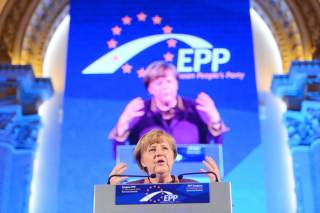How Germany's Merkel Can Lead the West
Germany must now hold the line against resurgent nationalism.
There are those, like the Economist, who doubt the chancellor is up to the task, despite viewing her as the West’s most important leader with a long list of achievements, both domestic and foreign. Their primary criticism is that she tends to hesitate—and even prevaricate—instead of possessing a tendency toward bold and decisive leadership. Doubts dwell, for example, on the fact that initially she gave Vladimir Putin a chance, despite widespread evidence of skullduggery and bad faith on the part of Russia.
However, Chancellor Merkel responded adroitly to Trump’s election more than any other world leader, congratulating him while at the same time laying out the terms for Europe’s cooperation and support. This amply demonstrated that Merkel is fully capable of being forceful when the circumstances require, including during her meeting with Trump last week. Holding Trump’s feet to the fire about the need to uphold liberal Western values even impressed Trump. And Merkel has led the charge in the EU of standing up to Russia over Ukraine and keeping the West united in negatively impacting Russia’s economy through economic sanctions.
Now the chancellor has the unenviable task of holding the EU together in the wake of the United Kingdom’s vote to leave, continuing challenges with absorbing refugees and the rise of populism on the European continent. But thus far the response to all this has been Germany leading the way with its EU partners in moving toward greater foreign policy and defense integration, despite widespread expectations that the EU will continue to doddle. Trump’s arrival is proving to be a catalyst for the EU to take strides that have long been anticipated but not come to fruition until now, such as the new EU military planning unit.
Yet with a German predilection for passivism and a small defense budget (compared to America’s defense budget), overall limitations may be a hindrance if Merkel and Germany’s foreign minister Sigmar Gabriel, defense minister Ursula von der Leyen and interior minister Thomas de Maizière were to begin filling the void left by Britain and France. Nonetheless, Germany has become more active abroad in recent years, and with less controversy than has met previous German moves toward taking on the mantle of European and global leadership.
Frank-Walter Steinmeier is another of Germany’s statesmen, having just become Germany’s next president. But it is the previous president, Joachim Gauck, who has been Germany’s most crucial voice in recent years. When it comes to the conscience of Germany, only Gauck speaks with widely regarded authority and legitimacy on all matters of geopolitics and the collective German psyche. Gauck reassuringly expresses considerable confidence in modern Germany’s acceptance of a greater global leadership role, and even a newfound modicum of pride among German people about playing that role. If and when the Western order is upheld, it may well be debatable about whether he or Chancellor Merkel is more deserving of receiving the Nobel Peace Prize.
Of course, Germany has been grappling with a massive tide of refugees, more than one million in the wake of Russian president Vladimir Putin’s effective weaponization of refugees from Syria. While Germany has led the world in being welcome to the absorption of refugees from the Middle East, it has come at a substantial cost. Although the estimation of Germany has risen around the world as a result, the policy of openness by the government has been unpopular and politically costly. The Alternative for Germany party will poll far short of a majority but will nonetheless likely enter the next German parliament, therein limiting the grand coalition majority of the conservatives.
While the media has been overstating an alleged shift in Western societies to right-wing populism, there is another potential strategic shift that German leadership can do the most to prevent: a shift among less powerful countries everywhere—and even certain powerful countries—into the orbit of Russia. Several east-central European countries have governments at present who symbolize this potential shift, but it will only truly happen if western European governments go down the same route with the United States joining them.
Only Chancellor Merkel—with the EU and NATO working in tandem with her government—can forestall the following outcomes: an off-kilter Ostpolitik in Germany, which is advocated by the German left; a French partnership with Russia by President Le Pen, whose party receives financial support from Moscow; the destabilization of Italy, after its referendum outcome; a hard Brexit by the United Kingdom, whose prime minister may prove persuadable to remain as the costs add up; and a strategic partnership with Russia by a President Trump, whose sober cabinet officials should prevent anything more serious than a personal Trump-Putin bromance that lacks strategic heft.
Certainly, Hillary Clinton would have helped Chancellor Merkel lead the West forward and vice versa. But President Trump may well ultimately prove more amenable to upholding the Western order than his recent behavior suggests, as at least he himself believes he had a successful summit meeting with Merkel. At least Justin Trudeau, Theresa May, Shinzō Abe and Emmanuel Macron will likely prove instrumental in helping the chancellor to be successful. Nothing short of the survival of the liberal international order depends on it.
Dr. Jeffrey A. Stacey is a former State Department official in the Obama administration and member of Secretary Clinton’s campaign foreign policy team. He is author of Integrating Europe by Oxford University Press, and is currently finishing a book entitled Rise of the East, End of the West?
Image: Angela Merkel in 2012. Flickr/Creative Commons/European People’s Party

